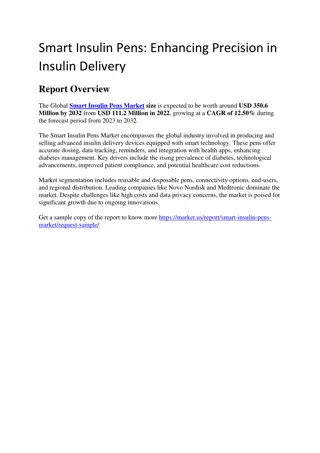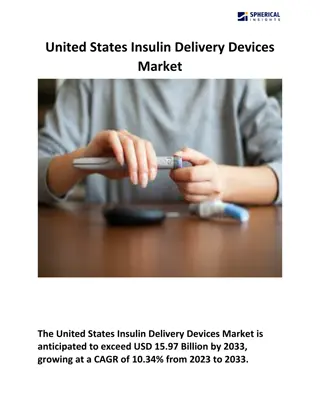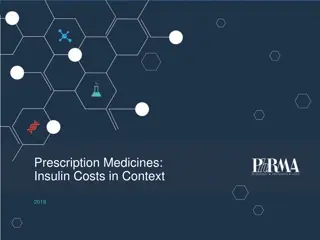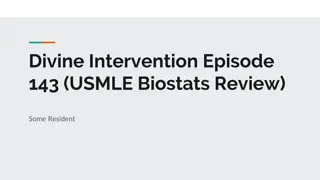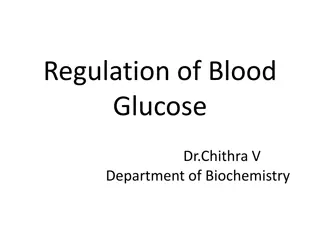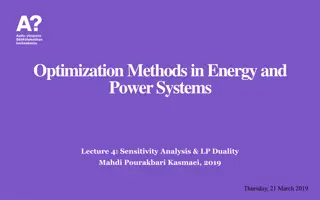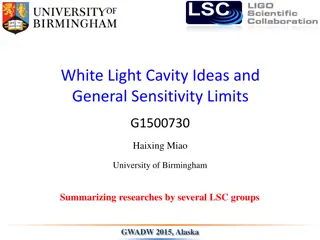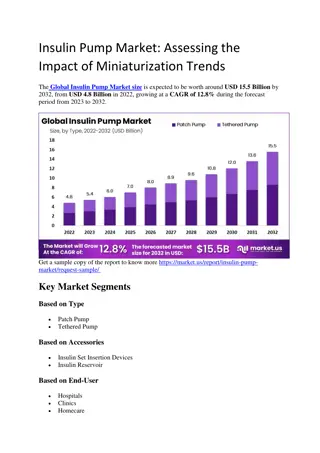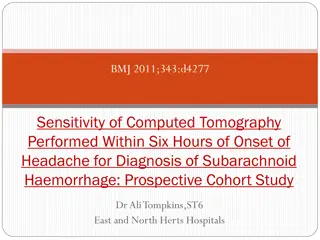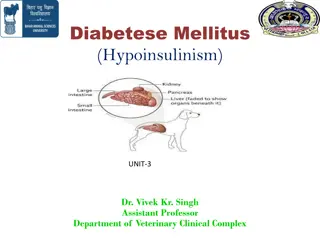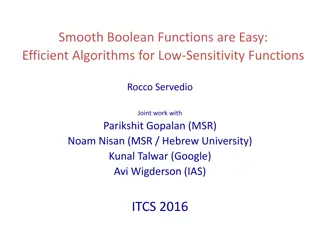Understanding Alinity i STAT High Sensitivity Troponin-I for Cardiovascular Diagnosis
Alinity i STAT High Sensitivity Troponin-I is a proprietary assay used in diagnosing myocardial infarction (MI) by quantitatively measuring cardiac troponin I in human plasma. This chemiluminescent microparticle immunoassay (CMIA) aids in the detection of MI, a significant aspect in managing heart d
2 views • 30 slides
Understanding Insulin Pump Therapy and Continuous Glucose Monitoring
Exploring the basics of insulin pump therapy, including the basal/bolus concept, operation of insulin pumps, advantages and limitations, day-to-day living with a pump, continuous glucose monitoring, and available systems.
1 views • 45 slides
Theresa S. Clark - Diabetes Educator Program Coordinator
Theresa S. Clark, MS, RD, LD, CDE, BC-ADM, is a dedicated Diabetes Educator and Program Coordinator at the Diabetes Resource Center in Hopkinsville, KY. She specializes in insulin therapies and teaches patients about insulin administration, carbohydrate counting, and mealtime insulin dosing. Certifi
1 views • 50 slides
Understanding Mendelian Human Genetic Traits
Explore various Mendelian human genetic traits such as tongue rolling, attached earlobes, interlocking fingers, dimples, sex determination, bent little finger, hitchhiker thumb, freckles, widow's peak, PTC taste sensitivity, sodium benzoate taste sensitivity, and thiourea taste sensitivity. Understa
0 views • 13 slides
The Impact of Smart Insulin Pens on Diabetes Care: Market Perspectives
The Global\u00a0Smart Insulin Pens Market size\u00a0is expected to be worth around\u00a0USD 350.6 Million by 2032\u00a0from\u00a0USD 111.2 Million in 2022, growing at a\u00a0CAGR of 12.50%\u00a0during the forecast period from 2023 to 2032.
0 views • 5 slides
Simulation-Based Training for Diabetes Care in Nursing
This simulation program, SCENS, focuses on enhancing nursing skills in managing diabetes-related complications such as hyper/hypoglycemia. The learning objectives include assessment, safe care provision, insulin administration, and effective communication. The simulation addresses the significant im
0 views • 17 slides
Overview of Anti-Diabetic Medication and Treatment Options
Anti-diabetic medications are used to treat diabetes by lowering glucose levels in the blood. There are various classes of drugs such as insulin, sensitizers, secretagogues, and more, each targeting different aspects of diabetes management. Type 1 diabetes requires insulin injections, while Type 2 d
0 views • 5 slides
United States Insulin Delivery Devices Market
\"The United States Insulin Delivery Devices Market is anticipated to exceed USD 15.97 Billion by 2033, growing at a CAGR of 10.34% from 2023 to 2033.\n\"\n
0 views • 4 slides
Understanding Diabetes: Types, Causes, and Prevention
Diabetes is a disease that affects how the body uses glucose, the main source of fuel. There are two main types of diabetes – Type 1 and Type 2. In Type 1 diabetes, the pancreas fails to produce insulin, while in Type 2, the body's cells do not respond properly to insulin. Uncontrolled diabetes ca
1 views • 14 slides
Human Insulin Gene Expression and Production
The process of cloning and expressing the human insulin gene has revolutionized the production of insulin for treating diabetes. By using genetically engineered bacteria, the human insulin gene is inserted, expressed, and purified to create insulin for therapeutic use. This innovation has overcome c
1 views • 20 slides
Sensitivity Analysis in Electric Power Systems
Sensitivity analysis in electric power systems involves examining the impact of parameter changes on system behavior. This lecture discusses linearized sensitivity analysis, matrix notation, injection shift factors (ISFs), and more, providing insights into system reliability and security. Concepts l
0 views • 43 slides
Insights into Insulin Costs and Diabetes Management in 2019
Medical innovation has revolutionized diabetes treatment, providing advanced insulin options for better blood sugar control and reducing complications. Improved medication adherence among diabetes patients can lead to significant cost savings and enhance health outcomes. Despite declining prices for
0 views • 10 slides
Diabetes Mellitus Type 1 Management Guidelines for Athletes
Diabetes Mellitus Type 1 is a chronic endocrine disorder characterized by hyperglycemia, absolute insulin deficiency, and autoimmune origins. This condition, more common among athletes, requires careful monitoring, insulin therapy, blood glucose management during exercise, and recognition of hypogly
0 views • 7 slides
USMLE Biostats Review: Insights on Sensitivity and Specificity
In this biostatistics review episode, key concepts of sensitivity and specificity in diagnostic tests are discussed using clinical scenarios. Through practical examples and explanations, viewers gain a solid understanding of interpreting sensitivity and specificity of tests in diagnosing medical con
0 views • 52 slides
Applications of Recombinant DNA Technology in Biotechnology
Explore the various applications of recombinant DNA technology in biotechnology, including insulin production for diabetes, enzyme production in food biotechnology, and the development of Golden Rice. Understand the process of insulin production using recombinant DNA technology and the significance
0 views • 32 slides
Understanding Type 1 Diabetes Pathophysiology and Etiology
Type 1 diabetes is characterized by absolute insulin deficiency, resulting from pancreatic beta cell destruction. It is prone to ketosis with a total deficit of circulating insulin, often due to autoimmune factors. The pathophysiology involves inflammation, immune-mediated cell destruction, and a ch
0 views • 13 slides
Regulation of Blood Glucose and Its Importance in Maintaining Health
Blood glucose regulation is crucial for energy supply in the body, particularly for brain function. Understanding the balance of glucose entering and leaving the blood through processes like absorption, glycogenolysis, and gluconeogenesis is vital. Hormones like insulin and glucagon play key roles i
0 views • 10 slides
Clinical Pharmacy Laboratory DM and Insulin Dosing Regimens
This comprehensive content covers various insulin dosing regimens used in clinical pharmacy laboratories for patients with diabetes mellitus. It includes examples of dosing regimens before meals and at bedtime, methods of insulin administration, vial images, mixing of different types of insulin, and
0 views • 14 slides
Sensitivity Analysis and LP Duality in Optimization Methods
Sensitivity analysis and LP duality play crucial roles in optimization methods for energy and power systems. Marginal values, shadow prices, and reduced costs provide valuable insights into the variability of the optimal solution and the impact of changes in input data. Understanding shadow prices h
0 views • 40 slides
Advances in White Light Cavity for Sensitivity and Bandwidth Optimization
The research discusses innovative ideas for enhancing sensitivity and bandwidth limits in the context of white light cavity technologies. It explores methods such as external/internal squeezing and signal recycling to surpass existing Mizuno Limits, shedding light on crucial issues for future upgrad
0 views • 27 slides
Insulin Pump Market
The\u00a0Global Insulin Pump Market size\u00a0is expected to be worth around\u00a0USD 15.5 Billion\u00a0by 2032, from\u00a0USD 4.8 Billion\u00a0in 2022, growing at a\u00a0CAGR of 12.8%\u00a0during the forecast period from 2023 to 2032.
0 views • 4 slides
Quantum Query Complexity Measures for Symmetric Functions
Explore the relationships between query complexity measures, including quantum query complexity, adversary bounds, and spectral sensitivity, in the context of symmetric functions. Analysis includes sensitivity graphs, the quantum query model, and approximate counting methods. Results cover spectral
0 views • 19 slides
Insulin Pens Market
The Insulin Pens Market is set to reach $6.73 bn by 2031, growing at 6.7% CAGR. Explore types, diabetes types, distribution channels, and healthcare settings.
0 views • 9 slides
The Insulin Pens Market is set to reach $6.73 bn by 2031
The Insulin Pens Market is set to reach $6.73 bn by 2031, growing at 6.7% CAGR. Explore types, diabetes types, distribution channels, and healthcare settings.
2 views • 9 slides
Smart Insulin Pens Market Set for Significant Expansion Amid Increasing Demand f
Smart Insulin Pens Market projected to reach $776.5 Mn by 2031, growing at a CAGR of 11.2% from 2024. Explore trends, drivers, and key players in the industry.\n
2 views • 9 slides
Understanding Diabetes Mellitus and Dental Plaque
Diabetes mellitus is an endocrine disorder characterized by high blood glucose levels due to insufficient insulin production or ineffectiveness. Type 1 diabetes is insulin-dependent and typically develops in childhood, while Type 2 diabetes is non-insulin dependent and often seen in overweight adult
0 views • 13 slides
Sensitivity of Early CT in Diagnosing Subarachnoid Haemorrhage
This prospective cohort study aimed to assess the sensitivity of early computed tomography (CT) in identifying subarachnoid haemorrhage (SAH) in patients with acute headache. Over 9 years, 5424 patients were evaluated, with 240 (7.7%) confirmed to have SAH. Sensitivity of CT within 6 hours of headac
0 views • 16 slides
Cutting-edge Proton EDM Storage Ring Experiment Insights
Detailed overview of the Proton EDM Storage Ring Experiment by William Morse, highlighting challenges in neutron EDM sensitivity, magic momentum phenomenon in electric fields, and advancements in proton EDM experiment sensitivity. Explore the critical parameters related to axion physics, CP-violatio
1 views • 16 slides
Understanding and Managing Hyperglycemic Crises: DKA and HHS
Hyperglycemic crises such as Diabetic Ketoacidosis (DKA) and Hyperglycemic Hyperosmolar State (HHS) are life-threatening emergencies characterized by severe hyperglycemia and metabolic imbalances. DKA involves absolute or near-absolute insulin deficiency leading to ketone body production and systemi
0 views • 82 slides
New Recommendations for Insulin Injection Technique and Needle Length - Guided by Expert Advice
The new recommendations emphasize using a 4mm needle for insulin injections to reduce the risk of incorrect administration. This needle length is suitable for children, adolescents, thin adults, and even obese patients. The guidelines also highlight the importance of perpendicular insertion of the n
0 views • 53 slides
Cutting-Edge Astrophysics Research at NextBASS: Advancing Sensitivity and Resolution
Cutting-edge research at NextBASS, a collaboration between University of Oxford and Hochschule Munich, aims to cover a frequency gap between 7-30 GHz with advanced technology. The project involves achieving equivalent sensitivity to future cosmic microwave background missions, utilizing multiple fee
0 views • 25 slides
Understanding Radio Telescope Sensitivity and Resolution in Radio Astronomy
This lecture covers the concepts of radio telescope sensitivity in detecting small temperature variations from the sky, including factors such as radiometric sensitivity, antenna noise temperature, receiver system noise, and more. Additionally, it touches upon the resolution capabilities of radio te
0 views • 22 slides
Pediatric Endocrinology Insulin Dosing Guide
Comprehensive reference for insulin dosing in pediatric endocrinology, covering onset, peak, and duration of action of various insulin preparations, guidelines for twice-daily dosing, managing Dawn Phenomenon and rebound hyperglycemia, and tips for multiple daily injections. Includes information on
0 views • 13 slides
Understanding Type 1 Diabetes: Causes, Symptoms, and Treatment
Type 1 diabetes is a condition where the pancreas fails to produce insulin, leading to high blood sugar levels. Without insulin, the body cannot use sugar for energy, resulting in various symptoms like hunger and fat burning. This article provides an overview of diabetes, how insulin works, and the
0 views • 13 slides
Understanding Diabetes Mellitus in Dogs: Causes, Symptoms, and Treatment
Diabetes mellitus is a common endocrine disorder in dogs, characterized by symptoms like polyuria, polyphagia, and cataract development. The etiology involves insulin deficiency and insulin resistance, leading to hyperglycemia and various clinical manifestations. Diagnosis is based on symptoms, glyc
0 views • 9 slides
Understanding Sensitivity and Specificity in Diagnostic Testing
Sensitivity and specificity are crucial measures in evaluating the accuracy of diagnostic tests. Sensitivity reflects the test's ability to correctly identify individuals with a particular condition, while specificity indicates its ability to correctly identify those without the condition. This comp
0 views • 21 slides
Understanding Canine Diabetes Mellitus: Causes, Symptoms, and Treatment
Canine diabetes mellitus is a common disease in dogs, primarily affecting middle-aged and older dogs. Unlike Type 2 diabetes in humans, dogs mainly experience insulin-dependent Type 1 diabetes. The condition results from beta cell dysfunction in the pancreas, leading to insulin deficiency. Causes in
0 views • 32 slides
Challenges and Plans for Reaching Advanced LIGO Detector Sensitivity
The presentation outlines the challenges and strategies for enhancing the sensitivity of the Advanced LIGO detector. It discusses the plan to interleave commissioning with observation runs, set sensitivity goals for early runs, and address major challenges like low-frequency noise and increasing las
0 views • 15 slides
Revolutionizing Diabetes Care with Innovative Insulin Pump Solutions
Diabetes is a serious health condition affecting millions worldwide. This project aims to address the growing prevalence of diabetes by introducing advanced insulin pump technology. With a focus on the US market and a comprehensive strategy, including market information, components of insulin pumps,
0 views • 14 slides
Understanding Complexity Measures of Boolean Functions
This work delves into the intricate world of complexity measures for Boolean functions, exploring concepts such as certificate complexity, decision tree depth, sensitivity, block sensitivity, PRAM complexity, and more. It sheds light on the relationships among different complexity measures and provi
0 views • 36 slides




